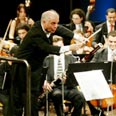
Barenboim's coexistence orchestra
Daniel Barenboim's greatest love is the West-Eastern Divan Orchestra where Israelis, Palestinians play side by side
Daniel Barenboim has played in and conducted thousands of concerts throughout his magnificent career, however for him the West-Eastern Divan Orchestra produces the most wonderful sounds he has ever heard.
Barenboim co-founded the orchestra, comprising Israeli and Palestinians members aged between 14 and 25, with his lifelong friend, Palestinian author Edward Said, who died in 2003.
On Sunday evening, before devoting himself to the Israeli Philharmonic Orchestra's 70th anniversary celebrations, Barneboim attended the viewing of the film "Knowing is just the Beginning," documenting the orchestra's history, set to be shown at the Tel Aviv Cinematheque.
Barenboim, 64, one of the world's greatest musicians, devoted himself to the orchestra after realizing that after nearly 40 years of conflict, there is no other way to achieve peace besides engaging in dialog with the Arabs.
"I did after all grow up here and I know how things developed," he says. "If we don't do what's necessary to be accepted by our neighbors, the future of Israel will be at stake. We shall not achieve security just by US aid and missiles, but by being accepted by our neighbors.
"It's not a good enough argument to simply say 'they don’t want us'. Of course they don't want us. We emerged from the war with an independent army, and they don't have a state. The moment you are in such a position, you can't say 'they don't want us.'"
There are very few artists who do such deeds, if at all.
"But it's not a matter of political orientation. The minute there is occupation you get inequality, and as soon as you have inequality you have no solution. The moment you have music, everyone is equal, and therefore the project has been successful. Before a Beethoven symphony we all become equal, whether you are Israeli, Palestinian or Syrian."
Do any arguments break out at your meetings?
"Of course, but when you play in an orchestra you have an obligation to express yourself, but at the same time to listen to the other instruments playing. If we could express ourselves and to listen to what others say, everything would be better.
"Musical dialog is far more concrete and much stronger than dialog with words. After a Syrian and an Israeli sit in the same group and play, in the evening they can discuss other matters as they have already formed a connection.
"A few days ago we played for the United Nations. There were people present from every country in the world, and the responses were very positive. I said in my speech that I could not recall such harmony between Israeli, Syrian and Egyptian representatives. It’s not that I believe (music) can resolve issues. It is not a peace orchestra; it is an orchestra that speaks out against ignorance."
You are repeatedly attacked about the project.
"It doesn't bother me, the moment you have an opinion about something there will also be people with opposing views – for and against. Who is attacking me? A few political people? How can that bother me? I don't have a better opinion of them than they have of me, so why should it bother me? Do I have a positive opinion of (Moshe) Katzav? No, I don't.
"I grew up her before the occupation of the Territories when morals and strategy were different. I grew up here at a time when people such as Yeshayahu Leibowitz and Martin Buber were around. Where are they now? That's the problem. The criticism against me ridicules the myth of Jewish intelligence. With every war we win, we emerge weaker politically because we lack political leaders with any intelligence and wisdom to think of another path."
Were there major crises at the workshops?
"No just legitimate arguments. What made me very happy this year, was that at the end of the tour we all sat and discussed how we could improve things, and some said they wanted to learn each others' language. So next year, we'll hire Arab teachers for the Israelis and Hebrew teachers for the Arab members."
On Monday Barenboim will be performing a piano recital as part of the 70th year anniversary celebrations for the Israel Philharmonic Orchestra. The following day he will be playing Beethoven's Piano Concerto No. 5, also known as the Emperor Concerto, to be conducted by Zubin Mehta.
"Playing with the Philharmonic Orchestra is another bit of sanity for me, I am pleased to come and play for the occasion. The Philharmonic Orchestra was always the cultural focus here. What's important now is that that acoustics will be improved in the Mann Auditorium. The architecture should remain as is, but the acoustics should be changed. The Israeli Philharmonic Orchestra sounds much better when it plays outside the auditorium."
People are saying that you were offered to lead the New York Philharmonic Orchestra?
"There's nothing further from my mind at present than taking a post in the United States. I am the Music Director of the Berlin State Opera; I play the piano and am very busy. In my view, it's not the greatest dream, despite it being a large orchestra.










